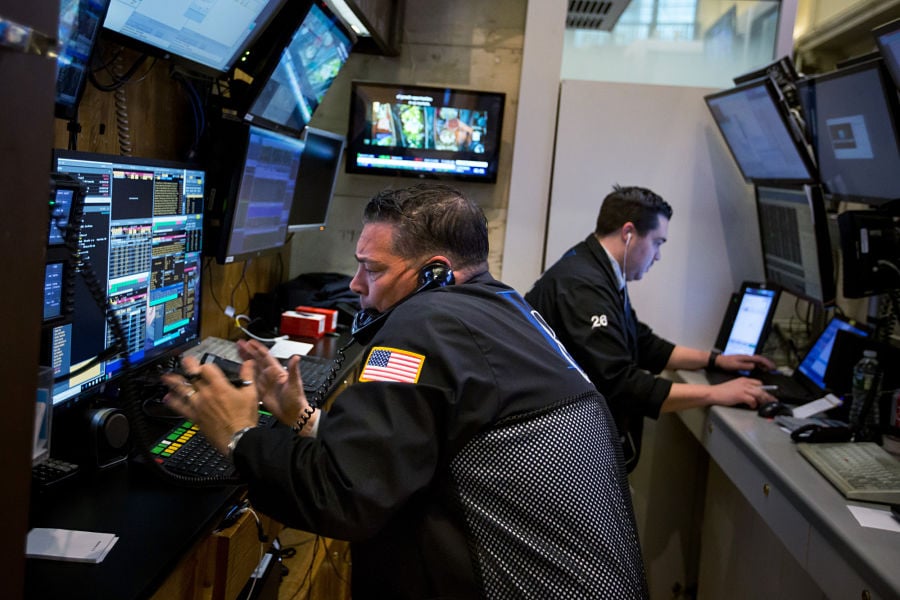

Crude prices crashed, equities plunged and Treasuries soared on Monday as the world headed for a full-blown price war in oil and panic appeared to grip financial markets.
In a dramatic day across assets globally, futures on the S&P 500 Index fell almost 5%, triggering trading curbs designed to limit the most dramatic moves while cash markets are closed. Two major exchange-traded funds that track U.S. benchmark gauges posted even bigger declines in premarket trading. They are not subject to the same curbs. Monday is the 11th anniversary of the U.S. bull market for stocks.
Crude at one point tumbled more than 30%, the most since the Gulf War in 1991, after an OPEC+ alliance that had contained global production disintegrated. WTI and Brent pared some of their losses but remained down more than 20%.
The 10-year Treasury yield fell below 0.5% and the 30-year yield dropped under 0.9%, taking the whole U.S. yield curve below 1% for the first time in history.
The Stoxx Europe 600 Index fell the most since 2016 on trading volumes exceeding three times the 100-day average. Several of the region’s gauges look set to enter bear markets. Japanese stocks entered one earlier when they tumbled almost 6%.
A U.S. derivatives index that measures the perceived risk of corporate credit surged by the most since Lehman Brothers collapsed.
Exchange rates including the yen saw sharp moves as traders struggled to establish where new ranges might be. The yen was up about 3% versus the dollar while the euro and Swiss franc both strengthened more than 1%.
If the crash in oil prices is sustained, it would upend politics and budgets around the world, exacerbate strains on high-yield credit and add pressure on central bankers trying to avert a recession. It typically would have proved a boon to consumers, but the coronavirus is increasingly keeping them at home. Over the weekend, Italy effectively put its industrial heartland in the north of the country on lockdown in an attempt to halt the spread of the illness.
Equities and haven assets showed little immediate reaction to news that President Donald Trump’s administration is drafting measures to blunt the economic fallout from the virus, including a temporary expansion of paid sick leave and possible help for companies facing disruption from the outbreak. A Bloomberg gauge of financial stress for the U.S. has deteriorated at the fastest pace since the great financial crisis.
“It is pretty nuts right now,” said Amy Wu Silverman, equity derivatives strategist at RBC Capital Markets, in an email Monday. “It feels like ‘07-’08, when every weekend it felt like the bottom was falling out. I still remember writing our report when VIX hit 80 and wondering if I would have to refresh it.”
Elsewhere, the spread between Italy’s 10-year sovereign yield and Germany’s jumped 39 basis points to 218 basis points, the highest since August.
In stocks, futures on the S&P 500 Index were down 4.9% as of 8:32 a.m. New York time. The Stoxx Europe 600 Index slumped 6.9%, the MSCI Asia Pacific Index sank 4.1%, and the MSCI All-Country World Index dropped 2.1%.
Meanwhile, the yield on 10-year Treasuries declined 29 basis points to 0.47%, while the yield on two-year Treasuries declined 23 basis points to 0.28%.
West Texas Intermediate crude dipped 23.8% to $31.46 a barrel, while Brent crude was off 23% at $34.88 a barrel.

Executives from LPL Financial, Cresset Partners hired for key roles.

Geopolitical tension has been managed well by the markets.

December cut is still a possiblity.

Canada, China among nations to react to president-elect's comments.

For several years, Leech allegedly favored some clients in trade allocations, at the cost of others, amounting to $600 million, according to the Department of Justice.
Streamline your outreach with Aidentified's AI-driven solutions
This season’s market volatility: Positioning for rate relief, income growth and the AI rebound
